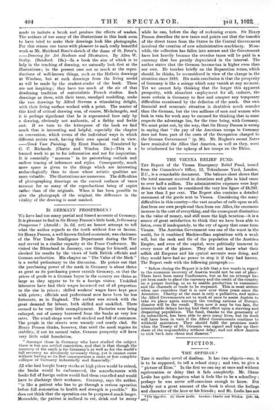IS GERMANY PROSPEROUS ?
WE have had too many partial and biased accounts of Germany. It is pleasant to find in Sir Henry Penson's little book, Is Germany Prosperous ? (Arnold : 3s. ed. net) an honest attempt to tell what the author regards as the truth without fear or favour. Sir Henry Penson, a well-known Oxford economist, was chairman of the War Trade Intelligence Department during the War and served in a similar capacity at the Peace Conference. He visited the. Rhineland in January, saw things for himself, and
checked his results by the views of both British officials and German authorities. His chapter on " The Value of the Mark " is a useful preliminary to the discussion. He points out that the purchasing power of the mark in Germany is about thrice
as great as its purchasing rower outside Germany, so that the prices of goods to a German buyer in the country are thrice as
large as they appear -to he to a foreign visitor. 'Unskilled labourers have had their wages increased out of all proportion to the rise in prices ; skilled workers' wages have kept pace with prices ; officials and professional men have been far less fortunate, as in England. The author was struck with the great demand for labour, both skilled and unskilled. There seemed to be very little unemployment. Factories were being enlarged, out of money borrowed from the Lanka at very low rates. The retail shops were well stocked and full of customers. The people in the streets were warmly and neatly clad. Sir Henry Penson thinks, however, that until the mark regains its stability, if not its normal value, German prosperity will have very little solid foundation.
" Amongst those in Germany who have studied the subject there is but one settled conviction, and that is that though the recovery of the mark is for Germany's as well as for the world's full recovery an absolutely necessary thing, yet it cannot come without having as its first consequences a more of less complete collapse of Germany industrially and financially."
All who had bought heavy stocks at high prices would be ruined, the banks would be embarrassed, the manufacturers with books full of foreign orders would find theni cancelled and would have to discharge their workmen. Germany, says -the"author, "is like a patient who has to go through a serious operation before full restoration to health and strength is possible." He does not think that the operation can be postponed much longer. Meanwhile; the patient is inclined to eat, drink and be merry While he can, before the day of reckoning comes. Sir Henry Penson describes the new taxes and points out that the transfer of the direct taxes from the States to the Central. Government involved the creation of new administrative machinery... Mean- while, the collection has fallen into arrears and the Government have lost heavily because the overdue taxes will be paid in a currency that has greatly depreciated in the interval. The author states that the German income-tax is higher even than our own. He touches briefly on the Reparation terms, which should, lie thinks, be reconsidered in .view of the change in the situation since 1919. His main conclusion is that the prosperity of Germany is like a mirage which may vanish at any moment. Yet we cannot help thinking that the longer this apparent prosperity, with abundant employment for all, endures, the more certain is Germany to face and conquer any temporary difficulties occasioned by the deflation of tho mark. Our own financial and economic situation is doubtless much sounder than the German, but the two millions of men and women who look in vain for work may be excused for thinking that in some respects the advantage lies, for the time being, with Germany. We must point out, by the way, that Sir Henry Penson is wrong in saying that " the pay of the American troops in Germany does not form part of the costs of the Occupation charged to the German Government " (p. 30). Mr. Hughes's recent Notes have reminded the Allies that America, as well as they, must be reimbursed for the upkeep of her troops on the Rhine.


































 Previous page
Previous page